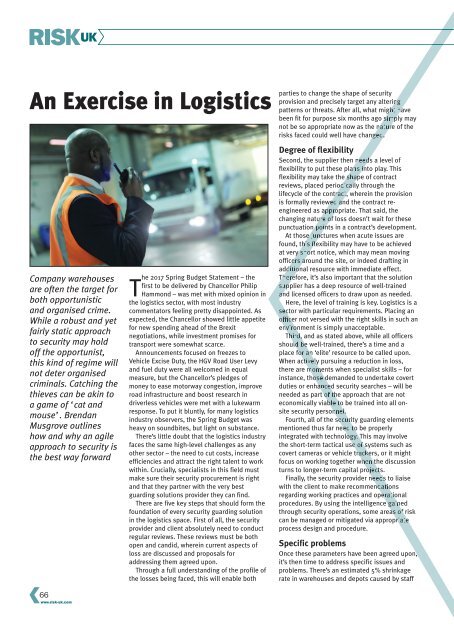RiskUKOctober2017
Create successful ePaper yourself
Turn your PDF publications into a flip-book with our unique Google optimized e-Paper software.
An Exercise in Logistics<br />
Company warehouses<br />
are often the target for<br />
both opportunistic<br />
and organised crime.<br />
While a robust and yet<br />
fairly static approach<br />
to security may hold<br />
off the opportunist,<br />
this kind of regime will<br />
not deter organised<br />
criminals. Catching the<br />
thieves can be akin to<br />
a game of ‘cat and<br />
mouse’. Brendan<br />
Musgrove outlines<br />
how and why an agile<br />
approach to security is<br />
the best way forward<br />
The 2017 Spring Budget Statement – the<br />
first to be delivered by Chancellor Philip<br />
Hammond – was met with mixed opinion in<br />
the logistics sector, with most industry<br />
commentators feeling pretty disappointed. As<br />
expected, the Chancellor showed little appetite<br />
for new spending ahead of the Brexit<br />
negotiations, while investment promises for<br />
transport were somewhat scarce.<br />
Announcements focused on freezes to<br />
Vehicle Excise Duty, the HGV Road User Levy<br />
and fuel duty were all welcomed in equal<br />
measure, but the Chancellor’s pledges of<br />
money to ease motorway congestion, improve<br />
road infrastructure and boost research in<br />
driverless vehicles were met with a lukewarm<br />
response. To put it bluntly, for many logistics<br />
industry observers, the Spring Budget was<br />
heavy on soundbites, but light on substance.<br />
There’s little doubt that the logistics industry<br />
faces the same high-level challenges as any<br />
other sector – the need to cut costs, increase<br />
efficiencies and attract the right talent to work<br />
within. Crucially, specialists in this field must<br />
make sure their security procurement is right<br />
and that they partner with the very best<br />
guarding solutions provider they can find.<br />
There are five key steps that should form the<br />
foundation of every security guarding solution<br />
in the logistics space. First of all, the security<br />
provider and client absolutely need to conduct<br />
regular reviews. These reviews must be both<br />
open and candid, wherein current aspects of<br />
loss are discussed and proposals for<br />
addressing them agreed upon.<br />
Through a full understanding of the profile of<br />
the losses being faced, this will enable both<br />
parties to change the shape of security<br />
provision and precisely target any altering<br />
patterns or threats. After all, what might have<br />
been fit for purpose six months ago simply may<br />
not be so appropriate now as the nature of the<br />
risks faced could well have changed.<br />
Degree of flexibility<br />
Second, the supplier then needs a level of<br />
flexibility to put these plans into play. This<br />
flexibility may take the shape of contract<br />
reviews, placed periodically through the<br />
lifecycle of the contract, wherein the provision<br />
is formally reviewed and the contract reengineered<br />
as appropriate. That said, the<br />
changing nature of loss doesn’t wait for these<br />
punctuation points in a contract’s development.<br />
At those junctures when acute issues are<br />
found, this flexibility may have to be achieved<br />
at very short notice, which may mean moving<br />
officers around the site, or indeed drafting in<br />
additional resource with immediate effect.<br />
Therefore, it’s also important that the solution<br />
supplier has a deep resource of well-trained<br />
and licensed officers to draw upon as needed.<br />
Here, the level of training is key. Logistics is a<br />
sector with particular requirements. Placing an<br />
officer not versed with the right skills in such an<br />
environment is simply unacceptable.<br />
Third, and as stated above, while all officers<br />
should be well-trained, there’s a time and a<br />
place for an ‘elite’ resource to be called upon.<br />
When actively pursuing a reduction in loss,<br />
there are moments when specialist skills – for<br />
instance, those demanded to undertake covert<br />
duties or enhanced security searches – will be<br />
needed as part of the approach that are not<br />
economically viable to be trained into all onsite<br />
security personnel.<br />
Fourth, all of the security guarding elements<br />
mentioned thus far need to be properly<br />
integrated with technology. This may involve<br />
the short-term tactical use of systems such as<br />
covert cameras or vehicle trackers, or it might<br />
focus on working together when the discussion<br />
turns to longer-term capital projects.<br />
Finally, the security provider needs to liaise<br />
with the client to make recommendations<br />
regarding working practices and operational<br />
procedures. By using the intelligence gained<br />
through security operations, some areas of risk<br />
can be managed or mitigated via appropriate<br />
process design and procedure.<br />
Specific problems<br />
Once these parameters have been agreed upon,<br />
it’s then time to address specific issues and<br />
problems. There’s an estimated 5% shrinkage<br />
rate in warehouses and depots caused by staff<br />
66<br />
www.risk-uk.com

















